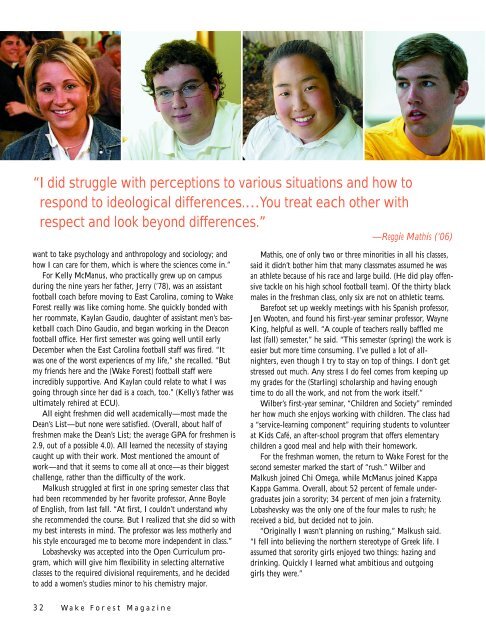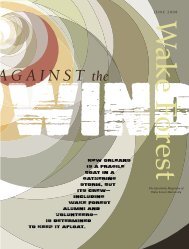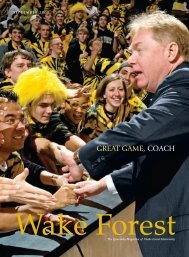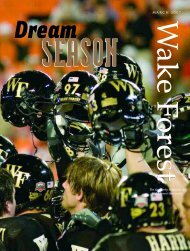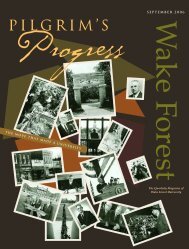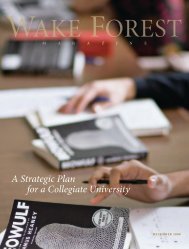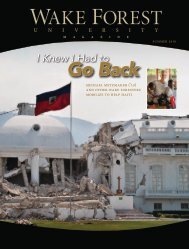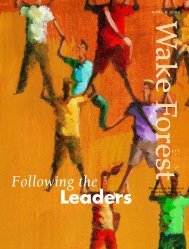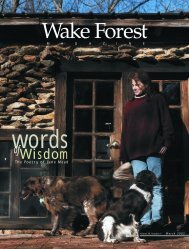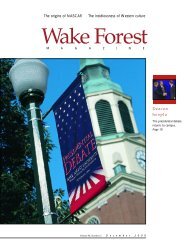Wake Forest Magazine June 2003 - Past Issues - Wake Forest ...
Wake Forest Magazine June 2003 - Past Issues - Wake Forest ...
Wake Forest Magazine June 2003 - Past Issues - Wake Forest ...
You also want an ePaper? Increase the reach of your titles
YUMPU automatically turns print PDFs into web optimized ePapers that Google loves.
“I did struggle with perceptions to various situations and how to<br />
respond to ideological differences.…You treat each other with<br />
respect and look beyond differences.”<br />
—Reggie Mathis (’06)<br />
want to take psychology and anthropology and sociology; and<br />
how I can care for them, which is where the sciences come in.”<br />
For Kelly McManus, who practically grew up on campus<br />
during the nine years her father, Jerry (’78), was an assistant<br />
football coach before moving to East Carolina, coming to <strong>Wake</strong><br />
<strong>Forest</strong> really was like coming home. She quickly bonded with<br />
her roommate, Kaylan Gaudio, daughter of assistant men’s basketball<br />
coach Dino Gaudio, and began working in the Deacon<br />
football office. Her first semester was going well until early<br />
December when the East Carolina football staff was fired. “It<br />
was one of the worst experiences of my life,” she recalled. “But<br />
my friends here and the (<strong>Wake</strong> <strong>Forest</strong>) football staff were<br />
incredibly supportive. And Kaylan could relate to what I was<br />
going through since her dad is a coach, too.” (Kelly’s father was<br />
ultimately rehired at ECU).<br />
All eight freshmen did well academically—most made the<br />
Dean’s List—but none were satisfied. (Overall, about half of<br />
freshmen make the Dean’s List; the average GPA for freshmen is<br />
2.9, out of a possible 4.0). All learned the necessity of staying<br />
caught up with their work. Most mentioned the amount of<br />
work—and that it seems to come all at once—as their biggest<br />
challenge, rather than the difficulty of the work.<br />
Malkush struggled at first in one spring semester class that<br />
had been recommended by her favorite professor, Anne Boyle<br />
of English, from last fall. “At first, I couldn’t understand why<br />
she recommended the course. But I realized that she did so with<br />
my best interests in mind. The professor was less motherly and<br />
his style encouraged me to become more independent in class.”<br />
Lobashevsky was accepted into the Open Curriculum program,<br />
which will give him flexibility in selecting alternative<br />
classes to the required divisional requirements, and he decided<br />
to add a women’s studies minor to his chemistry major.<br />
Mathis, one of only two or three minorities in all his classes,<br />
said it didn’t bother him that many classmates assumed he was<br />
an athlete because of his race and large build. (He did play offensive<br />
tackle on his high school football team). Of the thirty black<br />
males in the freshman class, only six are not on athletic teams.<br />
Barefoot set up weekly meetings with his Spanish professor,<br />
Jen Wooten, and found his first-year seminar professor, Wayne<br />
King, helpful as well. “A couple of teachers really baffled me<br />
last (fall) semester,” he said. “This semester (spring) the work is<br />
easier but more time consuming. I’ve pulled a lot of allnighters,<br />
even though I try to stay on top of things. I don’t get<br />
stressed out much. Any stress I do feel comes from keeping up<br />
my grades for the (Starling) scholarship and having enough<br />
time to do all the work, and not from the work itself.”<br />
Wilber’s first-year seminar, “Children and Society” reminded<br />
her how much she enjoys working with children. The class had<br />
a “service-learning component” requiring students to volunteer<br />
at Kids Café, an after-school program that offers elementary<br />
children a good meal and help with their homework.<br />
For the freshman women, the return to <strong>Wake</strong> <strong>Forest</strong> for the<br />
second semester marked the start of “rush.” Wilber and<br />
Malkush joined Chi Omega, while McManus joined Kappa<br />
Kappa Gamma. Overall, about 52 percent of female undergraduates<br />
join a sorority; 34 percent of men join a fraternity.<br />
Lobashevsky was the only one of the four males to rush; he<br />
received a bid, but decided not to join.<br />
“Originally I wasn’t planning on rushing,” Malkush said.<br />
“I fell into believing the northern stereotype of Greek life. I<br />
assumed that sorority girls enjoyed two things: hazing and<br />
drinking. Quickly I learned what ambitious and outgoing<br />
girls they were.”<br />
32 W ake <strong>Forest</strong> <strong>Magazine</strong>


